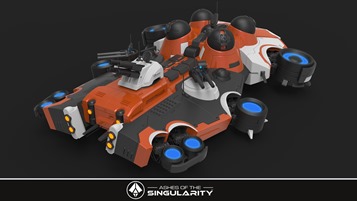
Our story so far...
Stardock loves real-time strategy games. Our customers love real-time strategy games (Sins of a Solar Empire remains our best selling game of all time). And we want your opinion on something important to us.
When Stardock sold off its digital distribution business to GameStop in 2011, we took that capital to help found a number of new studios including Soren Johnson's Mohawk Games, Mothership Entertainment, Stardock Towson and Oxide Games. Our goal was to build new technology and studios that would create innovative new games.
In short, we've been pretty busy.
Ashes of the Singularity: A background
Of these new games, the first to ship was Ashes of the Singularity. It is the first game to use the new Nitrous engine developed by Oxide Games.
Nitrous is an amazing engine and all our new games are standardizing on it. What makes it special is that it is core-neutral. That is, the more CPU cores you have, the more it can do. It scales almost linearly as you can more CPU cores. This means we can do interesting things like object space lighting, handle thousands of light sources, do all kinds of interesting things with AI, simulations, etc.
Since Ashes of the Singularity was the first engine to use it, we were cautious as to how much we would invest into the game itself. Nitrous is amazing but it was new. And the things we were trying to do had never been done before. There was no DirectX 12 or Vulkan when we started working on it. We were building it based on the theory that such a graphics platform would have to be made and got super lucky that they were made before the game shipped.
On DirectX 11, you need a pretty powerful machine to run Ashes of the Singularity (on DirectX 12 or later Vulkan, you can run it on a potato practically, that's how much better DX12/Vulkan are).
But, like I said, there was no DirectX 12 or Vulkan back then so we designed the game to appeal to as many people as possible while still showing off what the engine could do. If all went well, the game would sell around 50,000 units in its first year. That would be a very respectable release for a game that could only run on a fraction of the PCs available at the time.
DirectX 12
I can't even begin to tell you how much of a game-changer DirectX 12 was. Suddenly, this game that was going to require a monster machine to run could run on much more reasonable hardware. That's because DirectX 12 lets every CPU core talk to the graphics card at the same time. On DirectX 11, only 1 CPU core can talk to the GPU at once. As some may recall, people were dubious about the game's benchmark results on DirectX 12. But as people quickly saw, it was a massive difference.
Who is the target market?
During the early access program, there requests, often strident, for features that we felt would alienate the mainstream gamers. While we personally liked the features they wanted (upgradeable defenses, strategic zoom, more unit progress, etc.) we felt that this would create a learning curve that would keep us from even getting to the mere 50,000 units we hoped to sell to break even.
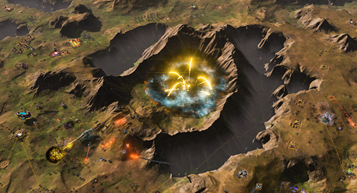
Ashes delivered massive-scale warfare across a planet
Release
When the game shipped, it quickly reached a user base of over a hundred thousand players not counting the hundreds of thousands of players who got the game as part of their video card purchase.
It also became apparent that many of them wanted an RTS a lot more depth where depth meant things like strategic zoom, upgradeable defenses, more resources, lots more unit classes, etc. But doing so, we felt, would be a bait-and-switch. I realize that some hard-core RTS fans can't imagine not wanting to have dozens of unit types but as someone who has tried and failed to get their friends to play FAF, learning curve matters.
So we decided to create a new SCU for those players who wanted a "bigger" RTS. Escalation.
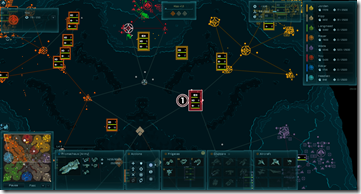
Escalation caters to the more dedicated RTS fan. Strategic Zoom, Upgradeable defenses, Specialized units
Divergence
Last fall, Ashes of the Singularity: Escalation was released. It's a stand-alone game with an $20 upgrade price for people who have the base game. It got universally favorable reviews (lowest review being a 75) in the media and has a 81 Steam score.
Meanwhile, the base game didn't fare as well . A lot a lot of passionate RTS players who had lobbied for what was in Escalation felt they were being asked to pay again for the game they wanted in the first place. Thus, the base's games Steam score went from "Mostly Positive" to something like "This game will kill your pets" on Steam even though the game has continued to get frequent updates, new units, etc.

One engine: Two games. The base game for the mainstream and Escalation for the dedicated RTS fanbase. Which game do people want us to focus our energy on?
Merging
And so here we are with the debate unresolved. Which kind of RTS do people want us to focus on? In the long-run, we need to focus on one RTS.
So here is the plan: Let the market decide.
What we want to do is give everyone who bought the game in early access or earlier a copy of Escalation (provided Steam and GOG are okay with this). Everyone who bought the upgrade from Ashes to Escalation will get a season pass to the DLC we're adding to Escalation.
Then, with user bases a bit more equal, we can see which game people prefer. Let the players choose which game they prefer based on what they actually play.
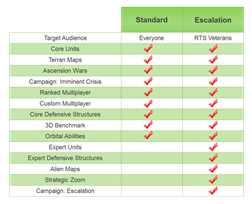
Feature difference between the two.
The Long-Term plan
The game's hardware requirements today (4 core CPU, 2GB of video memory, 1920x1080 resolution min) ensure that it won't be a mass market game either way for some time. And we are fine with that. In the not-so-distant future, these hardware requirements will be mainstream and by that point, both games will have evolved.
The base game will evolve so that it becomes easier to pick up and play. The price will continue to get reduced. The unit mix will continue to evolve (i.e. we may replace units with better, more interesting ones but keep the unit count reasonable). It'll still get new races to play, new campaigns and so on. But the game play will focus on being intuitive.
Escalation will evolve to have more depth. Naval units, additional resources, lots more units, more tech progression.
There is a case to be made for both. It'll be interesting to see which one becomes dominant.
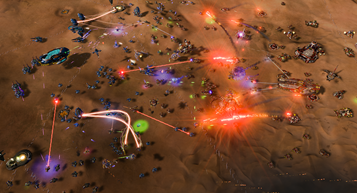
Escalation provides many more types of units and defenses to craft ever more sophisticated strategies
The question for you:
Which game fits you the best? The base game or Escalation? And why?